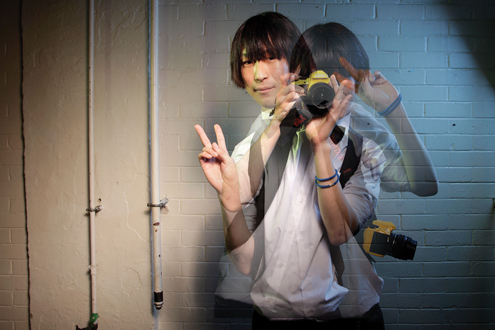
Richard Lederer outs words with contradictory meanings
Here’s a little finger exercise. Remember that I’m the teacher, so you must try to do what I ask. Make a circle with the fingers on your left hand by touching the tip of your index finger to the tip of your thumb. Now poke your head through that circle.
If you unsuccessfully tried to fit your head through the small digital circle, you (and almost any reader) thought that the phrase “poke your head” meant that your head was the poker. But if you raised your left hand with the circle of fingers up close to your forehead and poked your right index finger through that circle until it touched your forehead, you realized that the phrase “poke your head” has a second, and opposite, meaning: that the head is the pokee. Such words and compounds are called Janus-faced words or contronyms.
Here are two sentences that will solidify your understanding of how contronyms work:
“The moon is VISIBLE tonight.”
“The lights in the old house are always INVISIBLE.”
Although the two capitalized words are opposite in meaning, both can be replaced by the same word — out. When the moon or sun or stars are out, they are visible. When the lights are out, they are invisible.
Here are some contronymic words that show how words wander wondrously and testify to the fact that nothing in the English language is absolute:
* with. alongside; against: a. England fought with France against Germany. b. England fought with France;
* clip. fasten; separate: a. Clip the coupon to the newspaper. b. Clip the coupon from the newspaper. Similarly, trim, dust, dress;
* fast. firmly in one place; rapidly from one place to another: a. The pegs held the tent fast. b. She ran fast;
* hold up. support; hinder: a. Please hold up the sagging branch. b. Accidents hold up the flow of traffic;
* keep up. continue to fall; continue to stay up: a. The farmers hope that the rain will keep up. b. Damocles hoped that the sword above his head would keep up;
* cleave. separate; adhere firmly: a. A strong blow will cleave a plank in two. b. Bits of metal cleave to a magnet;
* sanction. give approval of; censure: a. The NCAA plans to sanction the event. b. Should our country impose a new sanction on Syria?;
* oversight. careful supervision; neglect: a. The foreman was responsible for the oversight of the project. b. The foreman’s oversight ruined the success of the project.
* burn. to destroy; to create: a. Let’s burn the evidence. b. Let’s burn a CD;
* wear. endure through use; decay through use: a. This suit will wear like iron. b. Water can cause mountains to wear;
* fix. restore, remove part of: a. It’s time to fix the fence. b. It’s time to fix the bull;
* take. obtain; offer: a. Professional photographers take good pictures. b. Professional models take good pictures;
* wind up. start; end: a. I have to wind up my watch. b. Now I have to wind up this discussion of curious and contrary contronyms.
Richard Lederer, MAT English and education, PhD linguistics, is the author of more than 40 books on language, history, and humor. This excerpt is from his latest book, Amazing Words, a career-capping anthology of bedazzling, beguiling, and bewitching words, available now at his website — http://www.verbivore.com.


